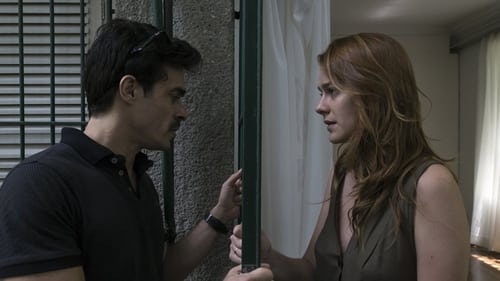
Producer

Co-Producer

Producer
Among the crosses of an old cemetery, two outlaws have a dispute over honor, companionship and greed.

Producer
A night delivery man meets a girl who works in a publishing house. He helps her deliver books to a warehouse during rainy days, and in each encounter an endearing bond forms between them.

Producer
In the largest city of Brazil, Lora is a free woman, full of life, who revels a different way to think about the situation of homeless people.

Co-Producer
In an attempt to reconnect with her family after four years, Isabela decides to introduce her liberal and free-loving boyfriend Giovani. HIs presence will be more important than they could ever imagine.

Co-Producer
원래 마의 황무지는 나훔 가드너라는 농부의 땅이었는데, 어느 날 나훔의 밭 한가운데에 운석이 떨어졌다. 이 운석은 어떤 수용액에도 녹지 않았고, 가만히 놔두면 열을 내면서 증발하여 사라졌다. 분광 스펙트럼을 분석한 결과 지구상에는 존재하지 않는 '색채(Color)'가 있는 것으로 밝혀졌다. 그러나 이후 나훔의 밭은 완전히 못 쓰게 되어버렸고, 밭에서 나는 식물이 괴상한 색을 띄었다. 나훔의 가족들은 점점 미치거나 죽거나 하면서 점점 파멸해갔다. 운석에서 발생한 괴상한 색채에 잠식되어 죽은 존재는 잿빛으로 변해서 부서져버렸다. 나훔의 집을 자주 찾던 아미는 나훔의 집에 사람이 얼마 남지 않은 걸 확인하고는 마을로 돌아가 경찰을 불러 나훔의 집으로 돌아오나, 나훔과 다른 가족들은 모두 죽은 것만 확인되었고, 도리어 색채가 아미 일행이 있는 나훔의 집을 습격하면서 일행은 위기에 처하게 된다. 겨우 뒷문을 통해 나훔의 집으로부터 멀리 떨어진 언덕까지 도망친 아미 일행은 나훔의 집이 잿빛으로 변해 스러지고, 집터 상공에 우주공간으로 연결된 것으로 보이는 포털이 열리면서 색채가 그곳으로 들어가는 걸 목격한다.

Executive Producer
Helena is beautiful, educated and well succeeded. But although she lives surrounded by beauty and wealth, she has been locked at home for weeks. When her son shows up unexpectedly and asks her to look after his daughter, Helena's routine is bound to change.

Executive Producer
A father's journey to save his son.

Producer
Kuduro (literally meaning 'hard arse') is an urban cultural movement that was born in Angola during the last decade of the Civil War. Created in discos and raves in downtown Luanda through a mixture between House and Techno beats and traditional Angolan rhythms, Kuduro spilled over from the center to the suburbs. It rapidly spread throughout Angola, through Africa and now all over the world. 'I LOVE KUDURO' follows the most idolized stars of this urban phenomena that today influences scores of young Africans.

Screenplay
Kuduro (literally meaning 'hard arse') is an urban cultural movement that was born in Angola during the last decade of the Civil War. Created in discos and raves in downtown Luanda through a mixture between House and Techno beats and traditional Angolan rhythms, Kuduro spilled over from the center to the suburbs. It rapidly spread throughout Angola, through Africa and now all over the world. 'I LOVE KUDURO' follows the most idolized stars of this urban phenomena that today influences scores of young Africans.

Director
Kuduro (literally meaning 'hard arse') is an urban cultural movement that was born in Angola during the last decade of the Civil War. Created in discos and raves in downtown Luanda through a mixture between House and Techno beats and traditional Angolan rhythms, Kuduro spilled over from the center to the suburbs. It rapidly spread throughout Angola, through Africa and now all over the world. 'I LOVE KUDURO' follows the most idolized stars of this urban phenomena that today influences scores of young Africans.

Producer
A day in the life of a grandpa.

Director
No Rio de Janeiro, a 13 km do Cristo Redentor, dois portugueses aventuraram-se na mais temida favela do Brasil, onde moram mais de 300.000 pessoas - o Complexo do Alemão. Em 2007, no período de maior tensão e violência no Rio de Janeiro, viveram a maior operação policial já realizada no estado, sentiram na pele como é a vida de um simples morador. O filme retrata este perigoso e complexo mundo, um universo paralelo inserido dentro de uma ordem maior, um mundo à parte, que segue uma ordem diferente da ordem global.

Producer
“From Love no one Escapes” is a documentary that portrays the interior of a Brazilian prison where a humanized system of incarceration, known as APAC, allows the absence of prison guards and weapons. After becoming volunteers in the prison and residing for more than a month under the semi-open regime, the documentarists recorded the daily life behind bars, inviting prisoners and employees of APAC to open their hearts and share their stories and perceptions about life. The documentary is mostly composed by informal conversations that portray different aspects of the lives of incarcerated individuals, such as spirituality, family life, work, music and the desire for freedom.










